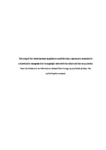The effects of mindfulness meditation on attention regulation
| dc.contributor.supervisor | Mitchell, Chris | |
| dc.contributor.author | Sharpe, Paul | |
| dc.contributor.other | Faculty of Health | en_US |
| dc.date.accessioned | 2021-08-23T10:44:07Z | |
| dc.date.issued | 2021 | |
| dc.identifier | 10345914 | en_US |
| dc.identifier.uri | http://hdl.handle.net/10026.1/17730 | |
| dc.description.abstract |
The research in this thesis tested the claim that mindfulness meditation regulates attention. Attention regulation was operationalised as an improvement on alerting, orienting or executive attention measured using the Attention Network Test (ANT), or a reduction in the attentional blink (AB) effect, measured using a Rapid Serial Visual Presentation (RSVP) task. Chapter 1 reviews the relevant literature. Chapters 2 and 3 report five experiments which tested the effects of Focused Attention Meditation (FAM) on the ANT. In Chapter 2, no effects of brief FAM were found on the ANT in novices (Experiment 1), or long-term meditators (Experiments 2 and 3). In Chapter 3, no effects were found on the ANT after novices completed either four weeks (Experiment 4), or eight weeks (Experiment 5) of FAM training. Motivated by the null findings in these experiments, Chapter 4 reports a systematic review and meta-analysis of studies which have tested the effects of meditation on the ANT. These meta-analyses found mindfulness meditation to have small improvements on executive attention in novices and long-term meditators, but there was limited evidence of improvements in alerting or orienting. Chapter 5 reports a precise replication of Colzato et al. (2015), which tested the effects of brief FAM and Open Monitoring Meditation (OMM) on the AB in novices. The finding that OMM reduces the AB to a greater extent than FAM was not replicated, but overall target accuracy on the RSVP task was greater in FAM and OMM relative to a relaxation control condition. Chapter 6 reports a systematic review and meta-analysis of all studies which have tested the effects of meditation on the AB. This found small AB reductions in novices and long-term meditators. Chapter 7 concludes that mindfulness meditation can produce small improvements to executive control, and that the RSVP task used to measure the AB may be more sensitive than the ANT at detecting these effects. | en_US |
| dc.description.sponsorship | School of Psychology, University of Plymouth | en_US |
| dc.language.iso | en | |
| dc.publisher | University of Plymouth | |
| dc.rights | Attribution-NonCommercial-NoDerivs 3.0 United States | * |
| dc.rights.uri | http://creativecommons.org/licenses/by-nc-nd/3.0/us/ | * |
| dc.subject | Mindfulness | en_US |
| dc.subject | Meditation | en_US |
| dc.subject | Attention | en_US |
| dc.subject | Psychology | en_US |
| dc.subject | Replication | en_US |
| dc.subject | Meta-analysis | en_US |
| dc.subject.classification | PhD | en_US |
| dc.title | The effects of mindfulness meditation on attention regulation | en_US |
| dc.type | Thesis | |
| plymouth.version | publishable | en_US |
| dc.identifier.doi | http://dx.doi.org/10.24382/1205 | |
| dc.rights.embargodate | 2022-08-23T10:44:07Z | |
| dc.rights.embargoperiod | 12 months | en_US |
| dc.type.qualification | Doctorate | en_US |
| rioxxterms.version | NA | |
| plymouth.orcid.id | https://orcid.org/0000-0002-6174-1625 | en_US |
Files in this item
This item appears in the following Collection(s)
-
01 Research Theses Main Collection
Research Theses Main



